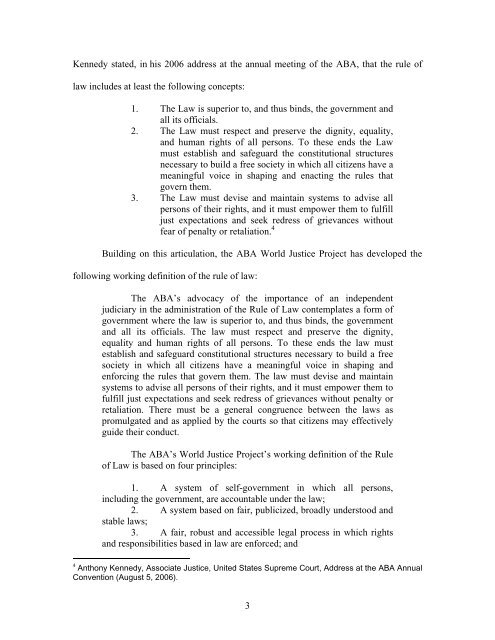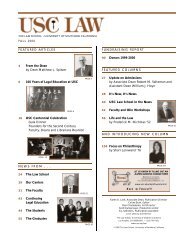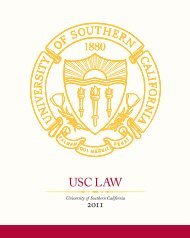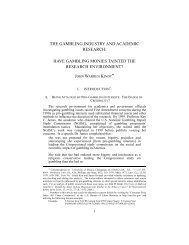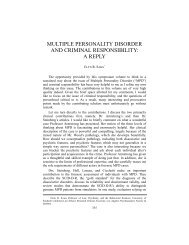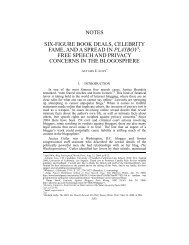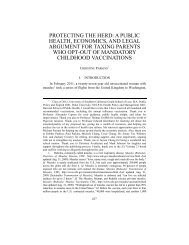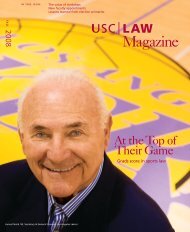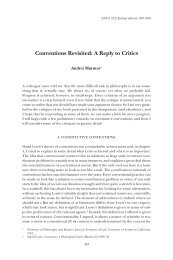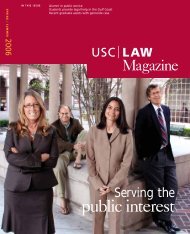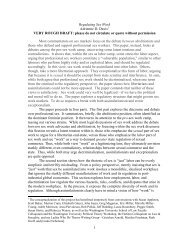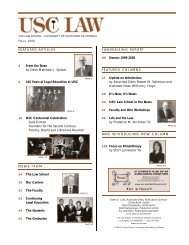Bufford Defining the Rule of Law
Bufford Defining the Rule of Law
Bufford Defining the Rule of Law
Create successful ePaper yourself
Turn your PDF publications into a flip-book with our unique Google optimized e-Paper software.
Kennedy stated, in his 2006 address at <strong>the</strong> annual meeting <strong>of</strong> <strong>the</strong> ABA, that <strong>the</strong> rule <strong>of</strong><br />
law includes at least <strong>the</strong> following concepts:<br />
1. The <strong>Law</strong> is superior to, and thus binds, <strong>the</strong> government and<br />
all its <strong>of</strong>ficials.<br />
2. The <strong>Law</strong> must respect and preserve <strong>the</strong> dignity, equality,<br />
and human rights <strong>of</strong> all persons. To <strong>the</strong>se ends <strong>the</strong> <strong>Law</strong><br />
must establish and safeguard <strong>the</strong> constitutional structures<br />
necessary to build a free society in which all citizens have a<br />
meaningful voice in shaping and enacting <strong>the</strong> rules that<br />
govern <strong>the</strong>m.<br />
3. The <strong>Law</strong> must devise and maintain systems to advise all<br />
persons <strong>of</strong> <strong>the</strong>ir rights, and it must empower <strong>the</strong>m to fulfill<br />
just expectations and seek redress <strong>of</strong> grievances without<br />
fear <strong>of</strong> penalty or retaliation. 4<br />
Building on this articulation, <strong>the</strong> ABA World Justice Project has developed <strong>the</strong><br />
following working definition <strong>of</strong> <strong>the</strong> rule <strong>of</strong> law:<br />
The ABA’s advocacy <strong>of</strong> <strong>the</strong> importance <strong>of</strong> an independent<br />
judiciary in <strong>the</strong> administration <strong>of</strong> <strong>the</strong> <strong>Rule</strong> <strong>of</strong> <strong>Law</strong> contemplates a form <strong>of</strong><br />
government where <strong>the</strong> law is superior to, and thus binds, <strong>the</strong> government<br />
and all its <strong>of</strong>ficials. The law must respect and preserve <strong>the</strong> dignity,<br />
equality and human rights <strong>of</strong> all persons. To <strong>the</strong>se ends <strong>the</strong> law must<br />
establish and safeguard constitutional structures necessary to build a free<br />
society in which all citizens have a meaningful voice in shaping and<br />
enforcing <strong>the</strong> rules that govern <strong>the</strong>m. The law must devise and maintain<br />
systems to advise all persons <strong>of</strong> <strong>the</strong>ir rights, and it must empower <strong>the</strong>m to<br />
fulfill just expectations and seek redress <strong>of</strong> grievances without penalty or<br />
retaliation. There must be a general congruence between <strong>the</strong> laws as<br />
promulgated and as applied by <strong>the</strong> courts so that citizens may effectively<br />
guide <strong>the</strong>ir conduct.<br />
The ABA’s World Justice Project’s working definition <strong>of</strong> <strong>the</strong> <strong>Rule</strong><br />
<strong>of</strong> <strong>Law</strong> is based on four principles:<br />
1. A system <strong>of</strong> self-government in which all persons,<br />
including <strong>the</strong> government, are accountable under <strong>the</strong> law;<br />
2. A system based on fair, publicized, broadly understood and<br />
stable laws;<br />
3. A fair, robust and accessible legal process in which rights<br />
and responsibilities based in law are enforced; and<br />
4<br />
Anthony Kennedy, Associate Justice, United States Supreme Court, Address at <strong>the</strong> ABA Annual<br />
Convention (August 5, 2006).<br />
3


